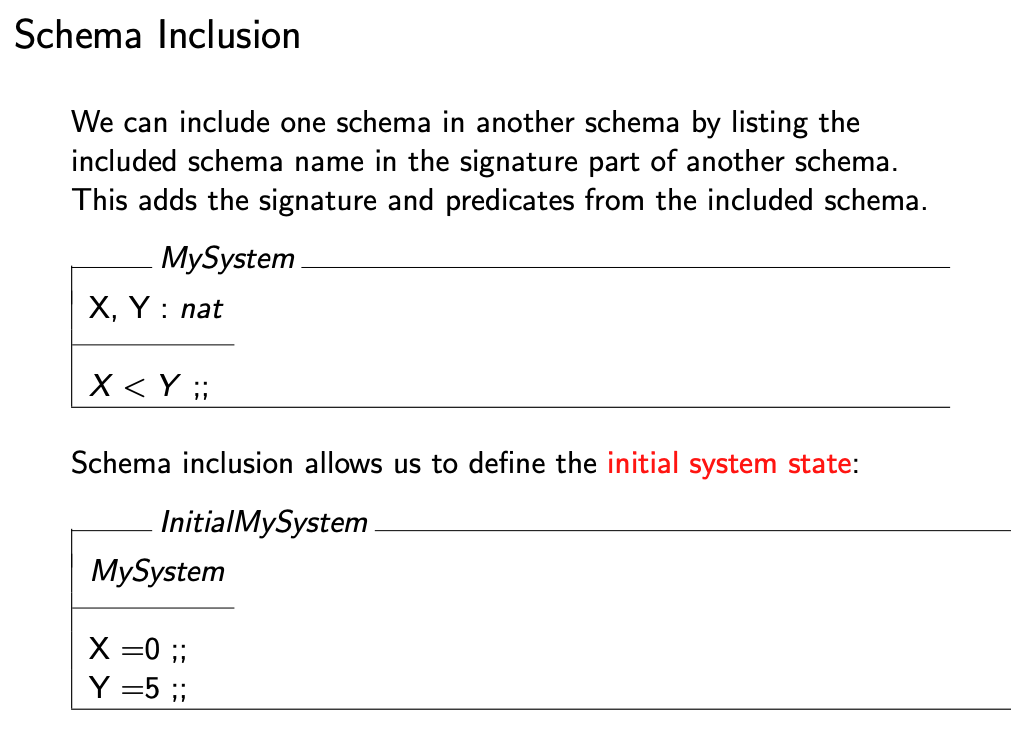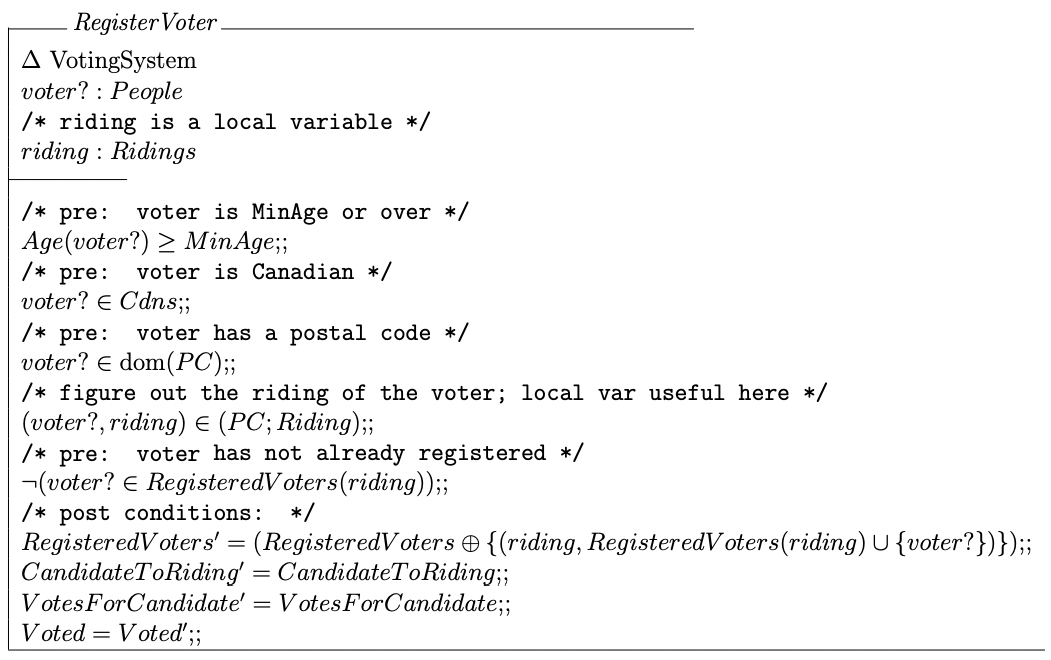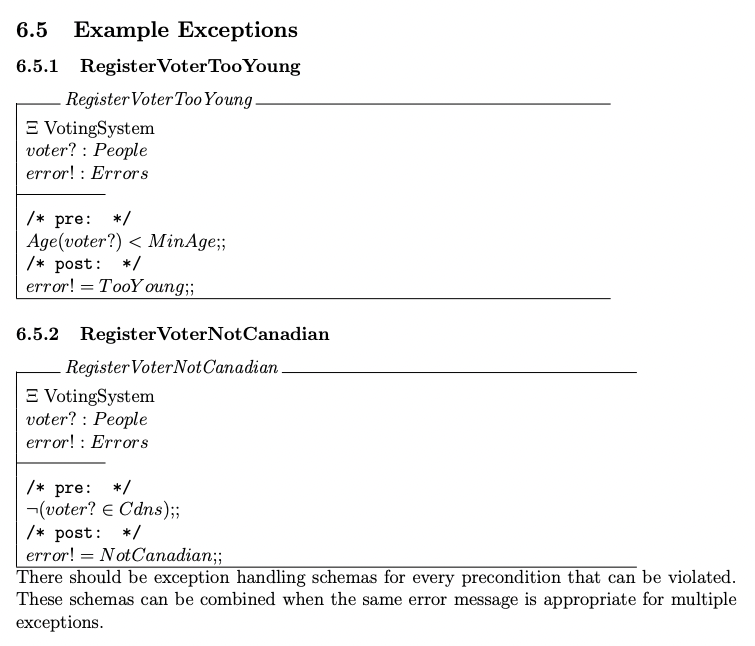Z Notation
The Z notation is a formal specification language used for describing and modelling computing systems. It is targeted at the clear specification of computer programs and computer-based systems in general. Developed at Oxford University.
Z Notation for Set Comprehension
For set comprehension, for we have the notation
- = term in Predicate Logic, i.e., an expression using variables and functions that returns a value.
- lists the variables used in and their types, can be omitted if we are doing Untyped Predicate Logic
- = any wff formula in predicate logic with the variables used in as free variables in the formula
can be written as which can be shortened to .
is the set
States
In Z, we think of the execution of a system as a sequence of states (trace) where each state is a mapping from variables (state elements) to values.
We specify the behaviour of the system by describing in logic what are valid steps of the system.
Z Specification
In a Z system specification, we describe:
- Generic and free types for data manipulated by the system (optional).
- Constants (elements that aren’t changed by the system) and their types (optional).
- State space (set of possible states): the system elements, their types and Invariants about relationships between the system elements.
- Initial state (optional).
- Operations and how these change the elements of the system
- Use NameOfSchema, which is equivalent to writing
- NameOfSchema
- NameOfSchema’
- Use NameOfSchema, which is equivalent to writing
Schema Inclusion
We use the schema inclusion to define the initial system state.

Input and Output
In Z, we use the following notation for inputs and outputs:
- “?” as in p? means p? is an input
- “!” as in q! means q! is an output
Local Variable
We can use a local variable, such as in the example below

Exceptions
I will probably need to add this in the exam.
Notice that for the errors, we don’t use a Schema. Rather we use a “zai” schema to represent the fact that operations on state variables do not change the state.
- You could also just use a standard Schema and just specify that all the states don’t change, but this is much quicker
- You output
error! : Errors

Working with Relations
If the tuple is part of a TOTAL function (you CANNOT do this if it is a non-total function):
- Use to get the 2nd element associated with
Else (for relation/non-total function)
- Use to get the SET of possible second elements associated with a 1st element
- Extract an arbitrary element using
- Use or to get the SET of possible 1st elements associated with a 2nd element
In Practice
So what I see is that there are a few steps
- Define your types
[ People,CdnPCs,Ridings ] // Way 1: generic types used in the specification
Errors ::= TooYoung|NotCanadian // Way 2: Enumerated types- List Out Constants as a Schema
schema Constants begin
MinAge:nat
Age:People --> nat
PC:People -|-> CdnPCs
Cdns:pow(People)
Riding:CdnPCs -->> Ridings
pred
MinAge = 18;;
end- List out State Space Schema
schema VotingSystem begin
CandidateToRiding:People -|-> Ridings
VotesForCandidate:People -|-> nat
RegisteredVoters:Ridings --> pow(People)
Voted:pow(People)
pred
// Candidates have to be in both relations
dom(CandidateToRiding) = dom(VotesForCandidate);;
// anyone who has voted has to be a registered Voter
Voted sube gen_U(ran(RegisteredVoters));;
// Candidates have to be Canadian
dom(CandidateToRiding) sube Cdns;;
// Registered Voters have to be Cdn
gen_U(ran(RegisteredVoters)) sube Cdns;;
// all voters have to be above minAge
forall x . x in Voted => Age(x) >= MinAge;;
// all candidates have to be above minAge
forall x . x in dom(CandidateToRiding) => Age(x) >= MinAge;;
end- List out initial State as a Schema
schema InitialVotingSystem begin
VotingSystem
pred
CandidateToRiding = empty;;
VotesForCandidate = empty;;
// all ridings have empty sets of registered voters
ran(RegisteredVoters) = {empty};;
Voted = empty;;
end- Add all of your operations
- This is where there are the key logics for your functions
- Don’t forget to add exceptions
- There should be exception handling schemas for every precondition that can be violated. These schemas can be combined when the same error message is appropriate for multiple exceptions
schema AddCandidate begin
Delta VotingSystem
candidate?:People
riding?:Ridings
pred
// pre: candidate is Canadian
candidate? in Cdns;;
// pre: candidate is above minAge
Age(candidate?) > MinAge;;
// pre: candidate lives in the riding
(candidate?, riding?) in PC ; Riding;;
// pre: not already a candidate
!(candidate? in dom(CandidateToRiding));;
// post: add the candidate to the list of candidates
CandidateToRiding' = CandidateToRiding union {(candidate?, riding?)};;
VotesForCandidate' = VotesForCandidate union {(candidate?, 0)};;
RegisteredVoters' = RegisteredVoters;;
Voted = Voted';;
end
schema RegisterVoter begin
Delta VotingSystem
voter?:People
// riding is a local variable
riding:Ridings
pred
// pre: voter is MinAge or over
Age(voter?) >= MinAge;;
// pre: voter is Canadian
voter? in Cdns;;
// pre: voter has a postal code
voter? in dom(PC);;
// figure out the riding of the voter; local var useful here
(voter?, riding) in PC ; Riding;;
// pre: voter has not already registered
!(voter? in RegisteredVoters(riding));;
// post conditions:
RegisteredVoters' = RegisteredVoters (+) {(riding, RegisteredVoters(riding) union {voter?})};;
CandidateToRiding' = CandidateToRiding;;
VotesForCandidate' = VotesForCandidate;;
Voted = Voted';;
end
schema Vote begin
Delta VotingSystem
voter?:People
candidate?:People
// local variable
riding:Ridings
pred
// pre: hasn't voted already
!(voter? in Voted);;
// voter? has an address
voter? in dom(PC);;
// set the value of local var; voter must have an address for this pair to exist
(voter?, riding) in PC ; Riding;;
// pre: voter has registered
voter? in RegisteredVoters(riding);;
// pre: candidate they want to vote for is a candidate in this riding
(candidate?, riding) in CandidateToRiding;;
// post conditions:
VotesForCandidate' = VotesForCandidate (+) {(candidate?, VotesForCandidate(candidate?) + 1)};;
Voted' = Voted union {voter?};;
CandidateToRiding' = CandidateToRiding;;
RegisteredVoters' = RegisteredVoters;;
end
schema DetermineWinner begin
Xi VotingSystem
riding?:Ridings
winners!:pow(People)
// local variable
candidates:pow(People)
pred
// could be a tie vote, so could have a set of winners
candidates = dom(CandidateToRiding |> {riding?});;
candidates != empty;;
// post condition:
winners! = { c if c in candidates & (forall d . d in candidates => VotesForCandidate(c) >= VotesForCandidate(d)) };;
end
schema RegisterVoterTooYoung begin
Xi VotingSystem
voter?:People
error!:Errors
pred
// pre:
Age(voter?) < MinAge;;
// post:
error! = TooYoung;;
end
schema RegisterVoterNotCanadian begin
Xi VotingSystem
voter?:People
error!:Errors
pred
// pre:
!(voter? in Cdns);;
// post:
error! = NotCanadian;;
end